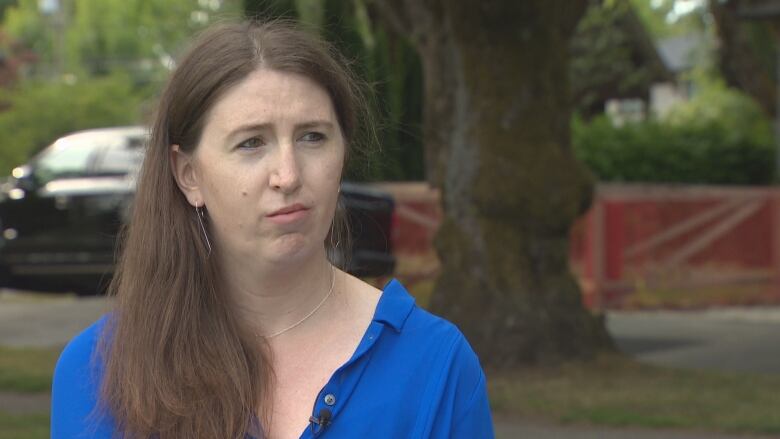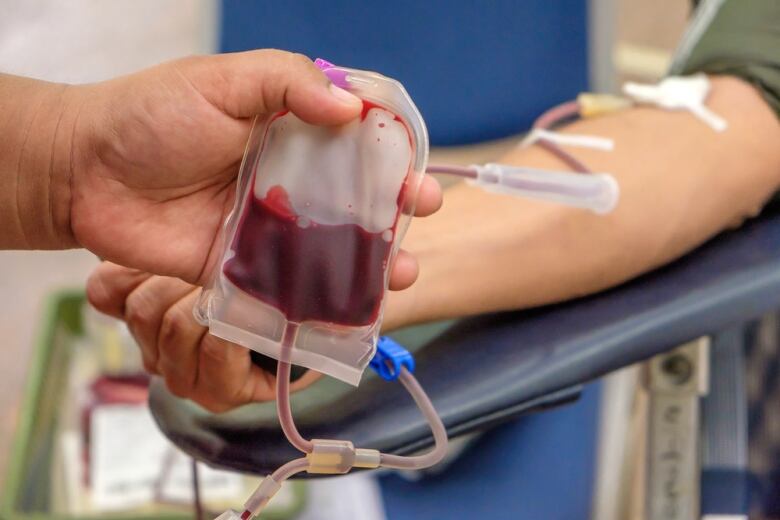LGBTQ advocates call for gender-neutral approach to blood donations
Vancouver trans woman says policies on donating blood stigmatize the LGTBQ community

Advocates of the LGBTQ community want Health Canada to change a policy which prevents gay men and trans women from donating blood.
Under current rules,gay, bisexual and other men who have sex with men are not allowed to donate blood within three months of having sex with a man.
Catherine Jenkins, a trans woman living in Vancouver, believes the wait policy is arbitrary and stigmatizes the LGBTQ community.
"It doesn't matter who I love and who I choose to date," said Jenkins. "My blood isn't 'dirty' compared to other folks."
Trans women who havereceived gender-affirming surgery to the lower body are also ineligible to donate for three months after the surgery.Trans women who have not received the surgery are ineligible to donate blood unless they have not had sex with a man within three months.
Not eligible to donate
Health Canada says its wait periodis based on data about HIV transmission in certain populations. As recently as 2017, the Centre for Communicable Diseases and Infection Controlpublished a report, which found that "gay, bisexual and other men who have sex with men" continued to represent almost 46.4 percent of all reported HIV cases in adults.
Jenkins remembers when she first learned that she wasn't eligible while filling out a Canadian Blood Services questionnaire.Once she recognized she didn't meet the criteria to donate, she checked a box indicating her blood should be destroyed.
"It wasn't a great feeling. It felt pretty gross."

But Dr. Supriya Sharma, chief medical adviser at Health Canada, said itspriority is to ensure the safety of Canada's blood supply.
"We have a history in Canada that we absolutely do not want to go back and revisit."
Inthe early 1980s, around 2,000 Canadians were infected with HIVafter tainted blood was circulated in the country's blood system.
The wait period for gay and bisexual men and trans women was reduced from 12 to three months in June 2019 after Health Canada approved a 2018 submission by CanadianBlood Services requestingthe change.
Gender-neutral model
Health Canada says it is open to eliminating the waitingperiod as long as the change is supported by evidence. It'sfunding 15 research projects investigating the eligibility criteria for men who have sex with men.
Nathan Lachowsky, who supervisesone of those projects out of the University of Victoria, believes Canada should adopt agender-neutral approach to blood donations.
This model has been implemented in several countries, including Spain, Portugal and Italy. Rather than the time-deferral model, which considers whether a partneris same-sex or opposite sex, the gender-neutral approach is based on sexual behaviours considered to be at higher risk, which may include sex with a new partner or with multiple partners.
Lachowsky says failing to updatethe policy to reflect modern Canadian values around genderis in itself a risk because it dissuades people from donating blood.
"If we are not getting new blood donors into the system we run the risk of not having a sufficient blood supply which would be quite catastrophic for a lot of people."
Canadian Blood Services undergoes regular reviews of its policies every two years, which means any submission to further reduce or eliminate thewaitingperiod couldn'thappen before 2020.
In the meantime, Health Canada says it sympathizes with members of the LGBTQ community who feel excluded.
"We can absolutely understand that they're frustrated when they're either subject to a lot of questions that they feel may be intrusive or they feel that they're being rejected when they're trying to do the right thing," said Sharma.












_(720p).jpg)


 OFFICIAL HD MUSIC VIDEO.jpg)
.jpg)



























































































